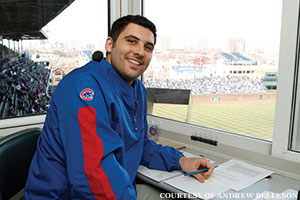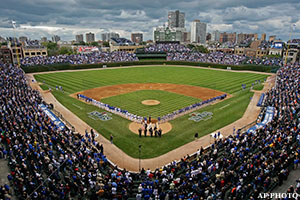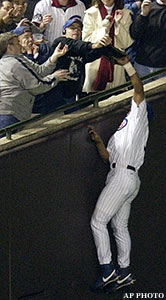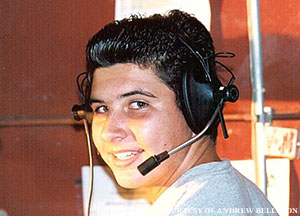The view of one of Andrew Belleson's favorite places on earth hasn't changed much since the first time he laid eyes on it as a boy.
And yet, when viewed from a new perspective -- the one he will have again this week as another baseball season dawns -- everything is somehow completely different.

The landmarks are all there just as they had been years before when the young boy walked, for the first time, into what is now the grown man's office.
The grass is just as green. The aging hand-operated scoreboard, the flags flapping from poles in the wind and the barren brick outfield are all just as Belleson remembers them to be.
The Chicago skyline, off in the distance, is just as majestic and the big lake that seems to know no bounds when seen looking out of the confines of Wrigley Field is just as magnificent as always.
But as Belleson again settles in and takes in the panoramic image from his office window located only a few feet to the window he peered up to as a boy, he can't help but become feel like he has a personal connection to one of baseball's greatest crown jewels.
After all, it's not often a man's voice becomes part of one of his favorite places on earth.
Andrew Belleson returns to work this week, perched above the setting where he first fell in love with baseball.
He came to Wrigley Field as a boy, each time making sure he and his parents had a clear view of Harry Caray's window from which the Cubs' iconic broadcaster leaned out of his window to conduct the singing of "Take Me Out To The Ballgame" during the seventh inning stretch.

All these years later, Wrigley Field still hasn't lost its luster. Even though the frequency with which Belleson -- now the venue's public address announcer -- returns has changed dramatically.
"You basically get the chills when you walk in," Belleson says. "To be able to go in there and to be able to call it your office is probably the coolest thing."
At 25, Belleson struggles to characterize what he does for a living 81 days a year work. It's the ultimate summer job, working as the voice of the ballpark where you discovered a game, in a city that has always been home and for a team you have always loved.
It's then when a job no longer seems like work for Belleson, a lifelong Chicago-area resident. And it's at times like this when Belleson -- who landed his first baseball job at 15 -- still pinches himself to know that when the Cubs open the season against the Washington Nationals, it will be his voice that will be the soundtrack for the rite of spring passage.
Andrew Belleson had spent the better part of a day last spring in his suburban apartment reading, re-reading and re-re-reading the script of his 1 minute, 56-second audition that soon had to be captured on video and submitted before an impending deadline.
Belleson figures by the time it was all said and done, he had done it 25 times, made 25 minor tweaks and adjustments, hoping to make the next a bit more perfect than it had been the time before.
Although the words on the page didn't change, each repetition had to sound the same.
"Now batting for the Chicago Cubs," Belleson belted out. "The shortstop, number 13, Starlin Castro."

Belleson had learned from his sister that the Cubs were searching for a new public address announcer. The process would be the same for each of the 2,974 applicants hoping to become the next voice of Wrigley Field.
Each applicant would read the same three scripts. A team of six Cubs employees spent eight hours a day for several days weeding through the video auditions, searching for someone to replace Paul Friedman, who spent 16 years on the job.
"It was a pretty special opportunity for a lot of people to achieve a lifelong dream," says Joe Rios, who manages the Cubs' special events, player relations and entertainment operations. "But in the end, you know what you like and what you don't like."
The original field was cut to 25 semifinalists and then again to four finalists. The second and third rounds of auditions were held at Wrigley Field and so Belleson knew if he wanted to go to work for his beloved Cubs, his voice had to be perfect.
Belleson had called minor league baseball games in the past, but this was the big leagues. He stuck to his simplistic broadcast style, hoping for the best, but understanding that beating out nearly 3,000 other applicants would be tough.
But this much he knew: Working at Wrigley Field beat making gyros at his family's hot dog stand inside a strip ball in suburban Chicago.

"It seemed like the biggest long shot in the world," Belleson says.
Even when he spent a day with 24 other semifinalists, Belleson wasn't ready to make the opportunity real in his head. But when he called back again to Wrigley Field -- this time as part of the Final Four -- Belleson started to believe he may have a chance.
In what amounted to a simulated Opening Day, Belleson read scripts -- now in front of members of the Cubs' front office and former players like Ernie Banks. He stuck with his initial strategy -- taking a just-the-facts, nothing-over-the-top, approach.
It proved to be just what the Cubs had in mind.
"In the end, Andrew just felt right," Rios says. "It was as if he was our starting pitcher. It was a pretty special moment."
Like with any job, there are good days and bad.
Belleson grew up playing baseball and continued to compete through college. The hardest part of now being part of the game, working for his hometown team, was stripping his feelings out of the equation.
Belleson grew up living and dying with the Cubs -- a team known more for its string of misfortune than for anything else. While there were some good times -- clinching the 1998 National League wild card -- there were plenty of heartaches as well.

Belleson still remembers being at a friend's house in 2003 when Steve Bartman came into contact with outfielder Moises Alou in the National League Championship Series with the Cubs a mere five outs from reaching the World Series.
As much as the bad times tend to stick with Cubs fans like Belleson, he is now forced to take a different approach.
"You have to detach yourself," Belleson says. "If there's a bad loss or something doesn't go your way for the Cubs, you can't take that home because there's nothing you can do to control it."
Sam Kruel, Belleson's broadcast partner at Concordia University's radio station, has gone to countless Cubs game with Belleson over the years. He counts Belleson as one of the more passionate, informed baseball fans he knows.
It's a trait that comes through in Belleson's work that's heard by more than 41,000 fans at each of the Cubs' 81 home games.
In only a short time, Belleson has become part of the experience.
"At Wrigley, people come more for the stadium and the team, and I don't think you need a lot of gimmicks," Kruel said. "His voice is so straight forward, so clear, so simple and I think people really appreciate that.
"It works real well and I think that's what is going to keep him up there for a while."
Belleson's work includes a fair share of preparation. In the days leading up to a homestand, Belleson studies the rosters of teams that will visit Wrigley Field. He will search for names that could prove to be tongue tying, knowing that in a job that demands perfection, one slip up on a last name could, in his world, amount to a game-changing error.

The biggest challenges come in the late season when a club makes minor league call-ups in an effort to switch things up in the midst of a losing season. After months of familiarity, a newcomer can prove tough on Belleson.
"You'll get guys that you've never heard of," Belleson says. "That's when you definitely have to ask for some help."
But for Belleson, that just goes along with the territory, hoping to use the experience he gained in his rookie season last year and build on it this season.
Belleson expects that this Opening Day will be much like the last. His first home opener seemed like a blur, filled with butterflies that accompany any first day on the job.
If the nerves weren't there, Belleson would figure something was wrong, leaving him to work through some early-inning uneasiness before settling into a groove. By now, game day is routine. He will arrive at Wrigley almost 3 1/2 hours before the 1:20 first pitch to take care of the details that need attending to. Belleson will get behind the microphone around noon, making announcements and blending in with the stadium organ as fans start to filter in.

Over the years, he has learned to listen to other public address announcers, noting how they do their job. Belleson makes a few mental notes, understanding there's always room to improve on in his craft.
But at the end of the day, Belleson relies on what he knows.
"I've got a pretty simple style," he says. "I guess I'm pretty fortunate that's what the Cubs wanted -- I'm not very flashy. I don't really believe in that. I just give the facts promptly and correctly and that's the key."
For Kruel, who attended last year's Opening Day just to hear Belleson work, the familiarity of the public address announcer's voice is still a bit strange to hear.
"It was just weird walking up (to Wrigley) and hearing a guy I've known for the past six or seven years and knowing 40,000 people are going to hear it 81 times a year," Kruel says. "It was kind of crazy."
As many times as he's been to Wrigley Field, the nostalgia for Belleson -- who makes off-season appearances at Cubs' events and who works as a voiceover artist -- still hasn't worn off.
This Opening Day, he will again look out over the right field wall on a summer's day and see Lake Michigan or he'll peruse the field and recall everything that's happened over the Cubs' storied history.
As much as he's gotten used to calling Wrigley Field his office, Belleson's inner little boy sometimes emerges.
He still loves the Cubs and like many die-hard fans, Belleson believes he will witness a World Series title sometime in his lifetime. He'll enter another season full of optimism, putting his faith in a new front office led by baseball boy wonder Theo Epstein -- all while working on a daily basis just down the hall from the space where his boyhood hero, Harry Caray, used to captivate boys with his familiar voice.
Now, even if it's on a much smaller scale, it's Belleson's voice that bellows around the Friendly Confines.
"It still doesn't seem real," Belleson says. "I'll be driving to the park and I'll just be so thankful that it is real because it hasn't sunk in."
-- Email Jeff Arnold at jeff.arnold@thepostgame.com and follow him on Twitter @jeff_arnold24.
Popular Stories On ThePostGame:
-- New Menu Items At MLB Stadiums Include Creations By Food Network
-- The Hottest New Running Trend
-- Train Smarter: The Truth About Swiss Balls
-- Coregasm Phenomenon Is Confirmed By New Scientific Study









